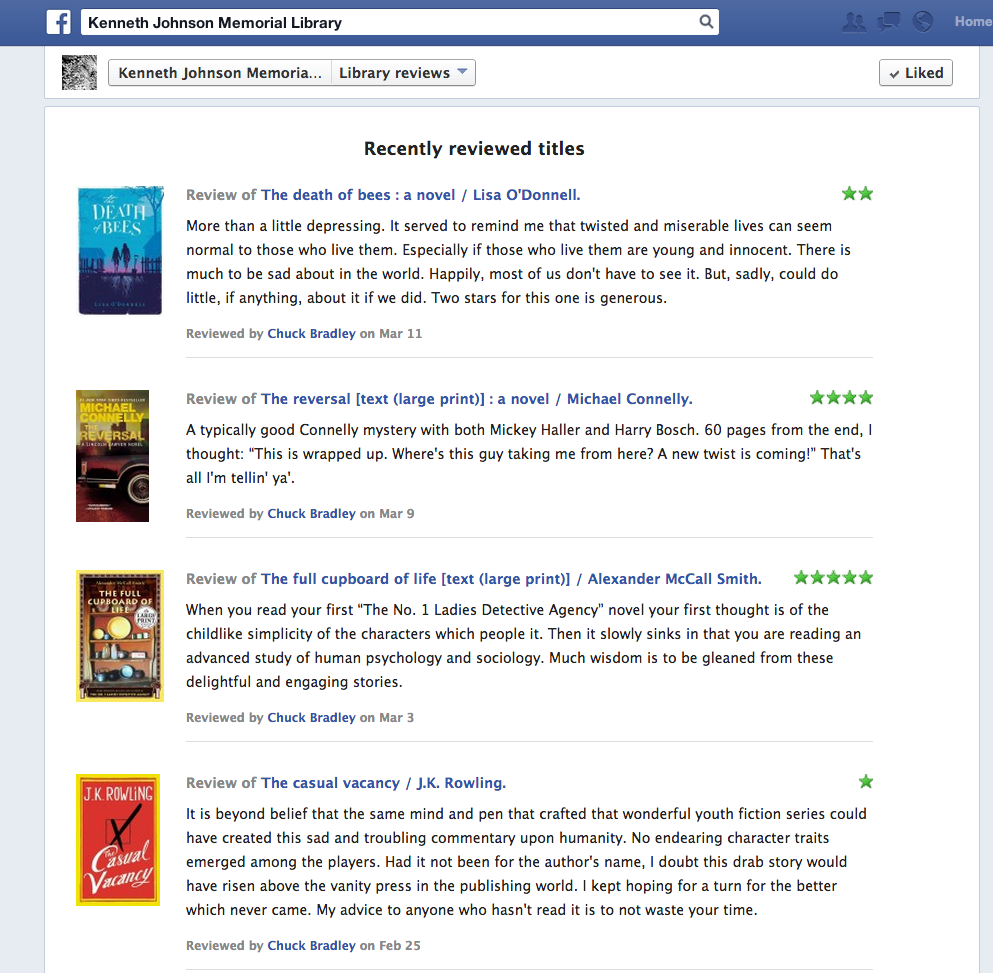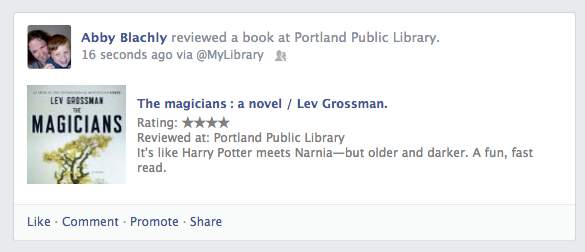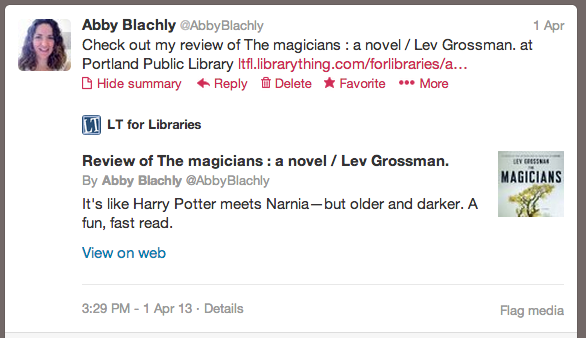
This month LibraryThing sat down with poet and editor Danielle Rose. Rose is the author of at first & then, which won the Fall 2019 Black River Chapbook Competition, as well as The History of Mountains, available through Variant Lit. Her poems have appeared in publications such as Hobart, Palette, and Sundog Lit. She was recently at the center of a social-media storm for comments about the state of poetry in the wider culture (see below), leading to her dismissal from her position as Poetry Editor at Barren Magazine.
“I wish poets understood that the general population has no interest in what we do, so when we speak we are speaking only to each other. The delusion that poetry is something powerful is a straight line to all kinds of toxic positivities that are really just us lying to ourselves.”
You’ve said that your position is not a defeatist one, but affirmative—even liberatory. What did you want fellow poets to take away from your original post?
Intent is a slippery, untrustworthy thing. It is so much in the moment, and our recollection is deeply influenced by our own feelings. My feelings have run a gamut—exhausted, indignant, astonished, cowed, jubilant, disgusted. In one way the tweet was a crude public frustration, in another way the tweet was a nasty dig at folks who genuinely believe that the whole world is composed of poetry all the way down. There was agreement and disagreement, a lot of conversation. Then some people showed up uninvited and broke everything fragile while setting the refuse bins on fire. I am reminded of Brian Massumi: “You are aware of the result, not the process.”
I wonder about confusion. The statement about the problem is not to be confused with the problem itself, although we are quick to do just that. Writers are so used to bending words that we have trouble recognizing when we are the ones being bent around the words we employ. If I could succinctly restate my position, I would do so. But that would be an essay covering already-well trod ground, which would address historical and cultural examples, etc… It would be read by maybe four people.
And somewhere in there I might cut to the banal ordinary and admit that it peeves me that so much of the conversation about poetry in a place like Twitter centers around a performative and uncritical register that contains hyperbolic exclamations about things like ‘power.’ If power is so commonplace what do we even mean by power? We too rarely interrogate our relationship to how language bends us around pillars of utterances that help us categorize our world. We should trace the consequence even if it is something we immediately feel is good.
But I think what I wanted and want is completely immaterial. If quiet, singular desire could win battles, we’d have no need for this kind of communication about communicating. I understand this may not be the most satisfying answer but sometimes answers are not satisfying. Sometimes they aren’t answers at all but instead a pile of questions that now demand your attention and this cycle never really stops, ever, all the way down forever.
If poetry is not meant to communicate with the wider culture and world, what is it for?
“Poetry is concerned with communication” is a quite unassailable position to stake out, I think. It is when we start to use those words that poets like to use with convenient definitions that can be shifted to suit whatever purpose is necessary, like power, that we begin to see problems. Or in other words that here, as well, our feelings shape our conceptions of truth. I think this might be something of an example of what Lauren Berlant and Kathleen Stewart refer to when they talk about ‘what sticks in the mind’ with regard to our beliefs and judgements. That we all encounter ideas and they attach themselves to us in individual ways. Our feelings about the question affect the content of the question. Such as assuming an active, results-oriented result in a field such as poetry. We want what sticks to us to be good for us, however we define that idea.
Instead of focusing on results and becoming bogged down in the aspirational (because concepts that stick reinforce themselves because they are a part of us) we can instead focus on process. What does a poem do? It becomes a record. Eventually, a history. I think there can be a strong argument for the usefulness of poetry in an ethnographic sense insomuch as poetry provides a unique opportunity for language to capture a particular bundle of otherwise intangible things. But at the end of the day poetry is reactive, it responds to something else; it deepens an understanding that is existent in-process, already.
You have stated that you were not “cancelled,” but the response to your post could suggest a desire for uniformity of thought in the poetry world. Is this about conformity?
I think that sometimes we encounter a concept that comes into conflict with the concepts that make up our own identity and this is generally part of a healthy, constant process of individual development. ‘Uniformity’ is ultimately a simplistic model. Berlant tells us about how norms are ‘spongy’ things, their purpose to soak up new concepts. I don’t think that is what is going on here, exactly. Or at least not about the reaction to the tweet, which is different from the tweet, itself. Sara Ahmed says, “The complainer becomes a complaint magnet, to become a complainer is to attract complaints,” and she is right. The lightning rod does not consent to be struck by lighting, it just is.
Maybe more immediate, I do not think you can point at the responses and subsequent discourse and find a coherent uniformity of belief. Everyone who agreed did so for their own, slightly different, reasons; everyone who disagreed did so for their own, slightly different, reasons. Which is a kind of uniformity, I suppose: A uniformity of minor disunion.
You have written of your great love for poetry, and of how you have been hurt by it. What makes poetry so powerful?
I see what you did here. I’m not certain it is helpful.
People have hurt me. More accurately, people’s actions and decisions have caused me harm in front of this backdrop we call ‘poetry.’ It is all just an argument about causal effect. What is doing harm, the poem? No, the poet. The community that affirms that poet despite the harms they cause. A poem cannot plot against you. A poem cannot punch you in the face leaving you with a nosebleed. A poem does not staunch the bleeding, after. We do not seek out poets to build bridges over rivers. There are edges and limits and boundaries to phenomena that we rarely understand more than experiencing a fleeting emotional feeling that becomes intertwined with the thing itself. And then we react with anger when the thing we have merged our selfhoods with is challenged.
None of this is a ‘good look.’ It is barely an identity. Berlant says, “Identity is marketed in national capitalism as a property. It is something you can purchase, or purchase a relation to. Or it is something you already own that you can express: my masculinity, my queerness.” All this possession and ownership and it is reflected in the actions of poets who cannot bear to watch their relationship with capital dressed down to the exploitative economics it actually is, under all the aspirational, self-promotional nonsense.
What poet(s) has/have been most influential in the development of your own work?
This is something that is always changing as I encounter new things and process new ideas. I am quite taken by work that situates itself on the borders of ‘poetry,’ where other disciplines and ideas can seep over that vague boundary and find a foothold somewhere a little new. Since poetry is a kind of produced tool, it should be expansive and useful—not reductive and exclusive.
In the rough contemporary milieu I find myself most drawn to Susan Stewart, Anne Carson, and Lauren Berlant. I have a type, I admit it.
Tell us about your personal library? What’s in it, and how do you organize it?
I dislike ‘getting rid’ of books. I keep everything, and my partner has to keep putting up new bookshelves so I don’t see this changing. It is mostly unorganized. Or it would look unorganized from the outside. Work is clustered by genre, author, etc… I have a few larger, topical collections that are worthy of the term ‘collection.’ They get their own shelves. In my home office I have a ‘working shelf’ of everything that I have touched recently and might need/want again.
And then there are piles of books scattered around the house, always.
I suppose I organize my books according to a momentary hierarchy of my own individual need.
What are you reading now?
Lauren Hough’s Leaving Isn’t the Hardest Thing, Alina Ștefănescu’s DOR, Diane Louie’s Fractal Shores. And whatever else passes across my desk because I soak it all in.
The book I have been most stuck in of recent has been Berlant & Stewart’s The Hundreds, which is an almost-perfect book. Or at least, it tries to actively work with what it is we do, as writers, instead of nailing everything to what we hope to be true before we even test the hypothesis.










